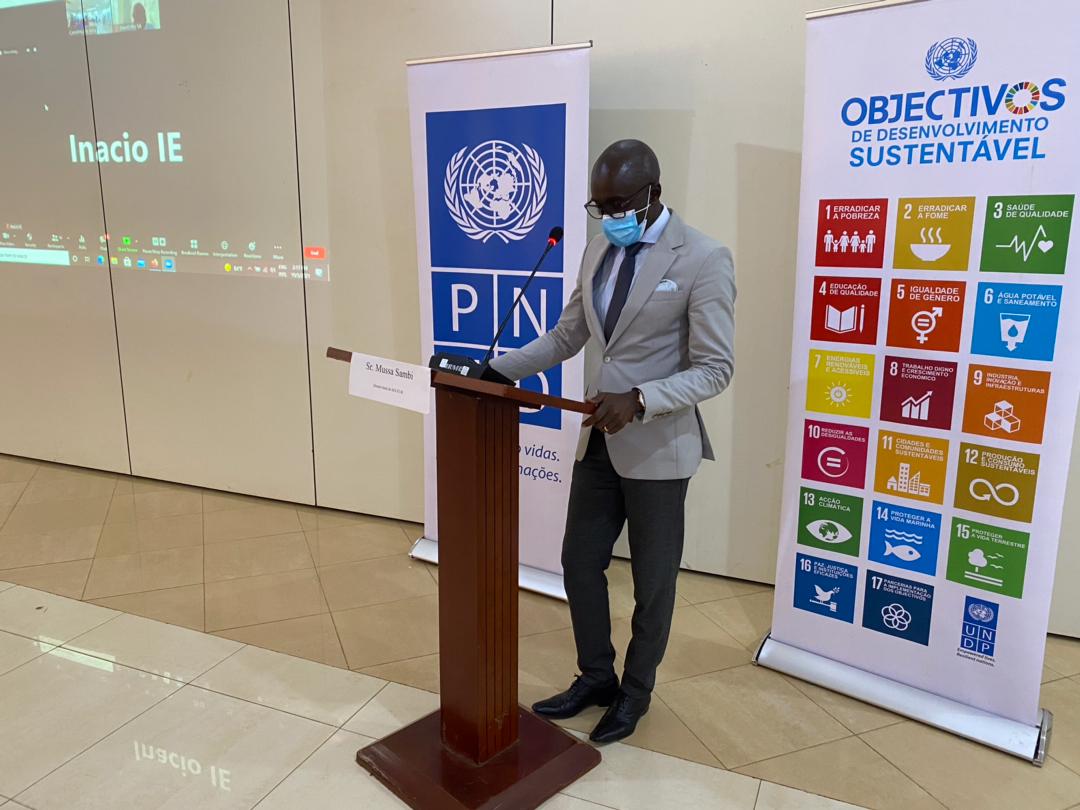Planning a Greener Future in Guinea Bissau

Photo: UNDP, 2021
Local experts will work with scientists from the University of Denver and UNDP Guinea Bissau to help improve economic and development growth policies
How can better roads lead to improvements in education? Will an increase in eco-tourism mean sustainable economic growth?
These are the types of questions that dozens of experts from the environmental, economic, government, and academic sectors in Guinea Bissau hope to address after they convened on October 5th in Bissau to discuss how to better “Plan for green growth in Guinea-Bissau” on the country’s economic and human development.
The meeting, organized by United Nations Development Programme in Guinea Bissau, was the first in efforts to train national experts on how to use the International Futures Model – an open-sourced data system – that helps forecast human and economic development. Their use of this system can eventually inform and guide policy decisions in the country to facilitate a more sustainable and greener future.
The International Futures model (IFs) uses more than 350 variables in a wide variety of sectors including environment, agriculture, education, and more, to gauge how these sectors interact with each other in order to forecast economic and development trends.
In partnership with UNDP Guinea Bissau, research scientists at the Pardee Center from the University of Denver will hold local trainings on how to use the IFs over the course of the next year for public policy actors, academics, civil society, and more. The trainings will focus on how they can use the model to help inform and guide public policies and interventions in the country to advance the achievements of the Sustainable Development Goals (SDGs).
“There is an economic system, an environmental system, a governance system, an agriculture system, and all those interactions to jointly shape human development,” says Willem Verhagen, a research scientist at the Pardee Center, who will help lead the trainings.
With the IFs, Verhagen adds that local leaders can learn not only what is needed to improve areas such as infrastructure, water and sanitation, and more, but also how those improvements will have ripple effects in other areas, such as education and poverty. “Sometimes you get unexpected results and that helps to constructively think about what to do today to try and impact development twenty or thirty years from now. In an ideal world, what it does is it first and foremost helps people think and focus on long-term human development to really get you to not only think about it, but also start testing the kind of policy angles.”
“The way we can work with it in Guinea Bissau is through the country level data, so you get a starting point that is unique to Guinea Bissau, and then we use the literature to understand what the measure issues are.”
Those present at the October fifth meeting included representatives from the Ministry of Economy, Planning and Regional Integration, Ministry of Tourism and Handicrafts, Ministry of Finance as well as from the National Institute of Studies and Research (INEP), Bissau Economics Lab, and more.
In-person participants, who were kept at around two dozen due to COVID-19 restrictions, all expressed interest in participating in future trainings on how to use the IFs to gather data and push for green growth solutions for Guinea Bissau.
During discussions at the event, local experts identified potential opportunities for green development in Guinea Bissau, such as energy development through investment in renewable energy, sustainable tourism, sustainable and controlled fishery through artisanal fishing, including ecology subjects in the school curriculum, and more.
Despite Guinea Bissau’s ranking as 178th out of 189 countries on the human development index and the challenges posed by financial restrictions, political instability, and more, many local experts and activists are enthusiastic that the small West African country has the potential to improve the wellbeing and standard of living through building upon Guinea Bissau’s Small Island Developing States (SIDS) characteristics that represent a unique green growth potential.
The country’s extensive coastline is home to mangrove forests, an 88-island archipelago that is a UNESCO Biosphere Reserve, and a thriving fishing sector – all of which have more potential say people like Mussa Sambi the director-general of the Economy Directorate for the Ministry of Economy, Planning and Regional Integration.
“Because of the pandemic of Covid 19, we saw the need to have more sustainable economic partnerships,” said Sambi. “As a SIDS country, advancing the blue and green economy is the natural path toward increased resilience”.



 Locations
Locations